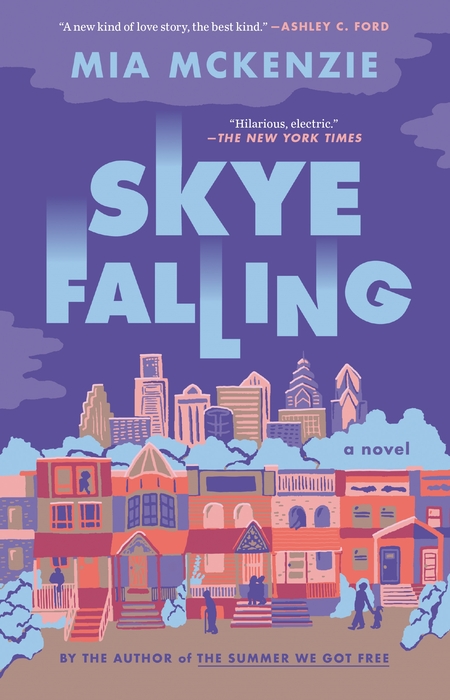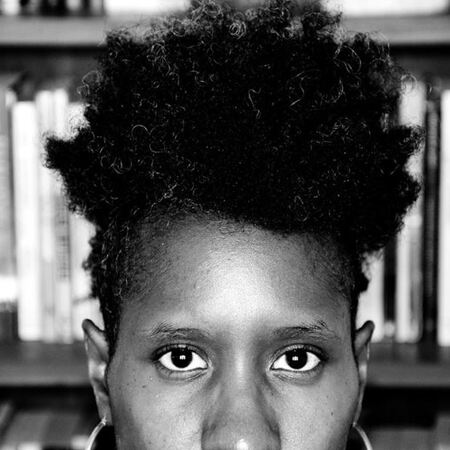(courtesy Penguins Books Australia)
If you’ve left for anything beyond a sliver of a slice of time, you will be well acquainted, often painfully so, with the fact that life is messy, chaotic, unruly beast.
It doesn’t meekly slot into the round holes we assign it nor does it compliantly and politely follow the rules ascribed to it, and goodness doesn’t humanity love rules from religious edicts to constitutional pronouncements, and it defies anyone who says this is what a perfect life looks like.
It simply doesn’t care, and yet people keep, usually of a sclerotically, grim-faced bent, insist on trying to make it look and act a certain way, something that the eponymous protagonist of Mia McKenzie’s novel, Skye Falling, knows can have devastating consequences.
Returning for one of her fortnight breaks between overseas tours that her company leads for Black travellers to her home town of Philadelphia, and specifically her neighbourhood of West Philly, which has memories glowingly good and distressingly bad depending on where she chooses to look, Skye Ellison is ready to rest and recover, all while keeping what’s left of her friends at arm’s length and try to keep life’s trauma-inducing unpredictability at bay.
She’s done all her life and she has no intention of stopping now.
But then one twelve-year-old gently accosts her at an event that her bestie Viva has dragged her to and says Skye is her egg donor mother, upending all the careful certainties Skye has laid out for herself.
I start to say no way, like how did we even end up here? I WAS ON MY WAY TO GET FRIES. But Viva’s looking at me expectantly and if I protest, she might decide I’ve become a jaded loner who no longer cares enough about anyone to put in some extra effort. I don’t want her to think that. Even though it’s probably true.
Vicky is a determined girl dealing with some traumatic issues of her own, and her initial insistence that she and Skye, who does not do relationships well, if at all, get to know each other, is met with a reasonably embarrassing response by Skye who can’t conceive of a world where a meaningful connection with someone is even possible.
Her response to the chaotic pain of her childhood has been to demarcate a line over which no in-depth human relationships can cross and yet Vicky not only crosses that line but forces Skye to consider whether her life, drained of all its connective colour, is really the one she wants to lead going forward.
Lest you think this means that Skye plunges into some Hallmark-ian tale of redemption and healing without a second thought and with all the rough edges of her broken world burnished away to a shiny, new life shine, think again because McKenzie has gleefully, and meaningfully, cast Skye as a fallible Everyperson who finds reinvention, connection and hope almost as bewildering as the pain that led her life to assume its current form in the first place.
Skye is prickly and awkward, ill-equipped for life and as apt to push people away as she is to climb out toilet windows to escape them, and Skye Falling thoughtfully doesn’t wave some magic wand to make into the sort of person who says goodbye in an instant to scarring pain and loss and skips joyfully into a sunlit, highly-connected and rewardingly loved future.
(courtesy official author site (c) Mia McKenzie)
And thank the writing gods for that.
Because if you have ever looked around at glossy representations of life and wished you could that kind of Instagram-esque, loved-up perfection and then looked at your broken, sorry self thought “Nope, not happening”, then Skye is the person you want to have around you.
She doesn’t get it right, she keeps choosing safety and certainty over the messy vivacity of being alive, and she reassures you that even when you are brave enough to connect and try to pursue the gleaming promise of relating meaningfully to another person that you are going to keep getting strong simply because trauma and those protective mechanisms we put in place to survive it do not give up that easily.
Skye ends up loving hanging with Vicky, and her aunt who, embarrassingly, is the woman she tried to pick up in a record story one day, and even finds a way back to her estranged mum and brother, despite a whole host of reservations, but she never stops, for much of the novel and almost at the end of it, matching every step forward with a gigantic leap backwards.
In other words, she is deliciously, charmingly and wondrously human and she invests Skye Falling with a rich, grounded and relatable humanity that makes you feel as if you’re not a big, fat failure because you don’t infallibly greet the prospect of healing, meaningful love and connection with open arms.
We stay in the vegetable patch for a while, planting tomatoes—then wedding, then watering—and talking. A few times, my mind wanders again to images of myself here, belonging with Vicky and Faye. Each time it does, I feel the same stabbing pain in my chest. And I push the thoughts away as fast as I can.
I mean, you should right, you really should, because who wouldn’t?
Well, plenty of us to be fair; we can see what’s on offer and we know how good letting good of our safety mechanisms would be because we don’t dead and dusty they now are, but can we leave the spot to which our trauma rooted us? No, no we cannot, and Skye represents everyone last one of us in ways that cut right to the soul and endear her to you so hard that she feels like a slice of yourself and family all rolled into one.
Queer to its core, and as laugh-out-loud funny as it is seriously, emotionally impactful, Skye Falling is a gem of a novel that doesn’t pretend you can tame or smooth out life’s wildest, messiest impulses.
It doesn’t say that life, especially a queer one which comes laden with challenges and rewards all its own, can ever be brought to heel, but what it does do, through the gloriously good imperfection of Skye is show us that you can go forward even while battling to leave the spot on which you stand and which has sustained through your pain until all of a sudden it cannot.
What you do next isn’t neat, it isn’t linear and it isn’t clean or easy but it is living, something Skye hasn’t really done for years, and as Skye Falling winds its way to an upliftingly grounded end with snappy, smart and funny dialogue, a keen eye on what it means to be queer and Black and Other, and warmly inviting characters who feel like family by book’s end, you realise that even in healing and renewed connection, life will not yield its chaotic symphony of madness and that that’s okay because in the midst of the storm, you can find a storm and as Skye attests, that’s all you really need.

